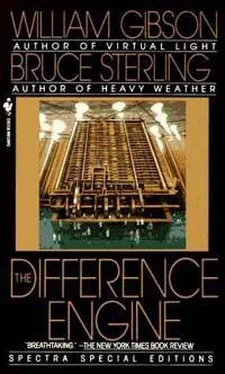William Gibson - The Difference Engine
Здесь есть возможность читать онлайн «William Gibson - The Difference Engine» весь текст электронной книги совершенно бесплатно (целиком полную версию без сокращений). В некоторых случаях можно слушать аудио, скачать через торрент в формате fb2 и присутствует краткое содержание. Жанр: sf_cyber_punk, fantasy_alt_hist, на английском языке. Описание произведения, (предисловие) а так же отзывы посетителей доступны на портале библиотеки ЛибКат.
- Название:The Difference Engine
- Автор:
- Жанр:
- Год:неизвестен
- ISBN:нет данных
- Рейтинг книги:3 / 5. Голосов: 1
-
Избранное:Добавить в избранное
- Отзывы:
-
Ваша оценка:
- 60
- 1
- 2
- 3
- 4
- 5
The Difference Engine: краткое содержание, описание и аннотация
Предлагаем к чтению аннотацию, описание, краткое содержание или предисловие (зависит от того, что написал сам автор книги «The Difference Engine»). Если вы не нашли необходимую информацию о книге — напишите в комментариях, мы постараемся отыскать её.
The Difference Engine — читать онлайн бесплатно полную книгу (весь текст) целиком
Ниже представлен текст книги, разбитый по страницам. Система сохранения места последней прочитанной страницы, позволяет с удобством читать онлайн бесплатно книгу «The Difference Engine», без необходимости каждый раз заново искать на чём Вы остановились. Поставьте закладку, и сможете в любой момент перейти на страницу, на которой закончили чтение.
Интервал:
Закладка:
Mallory had found nothing to equal shopping in its gratifying demonstration of the power of his new-found wealth. He had won his money through an act of half-mad bravado, but the secret of its origin was safe with him. London's credit-machines clicked for the vaporous profits of gambling as readily as they did for the widow's mite.
So what was it to be? This giant iron vase, with octagonal base, with eight open-work screens hanging before its fluted pedestal, giving a singular lightness and elegance to the entire object? This carved box-wood bracket with sculpted canopy, the intended mounting of a Venetian-glass thermometer? This ebony salt-cellar enriched with columns and elaborate sunken panels, accompanied by a silver salt-spoon rich with trefoils, oak-leaves, a spiral-girded stem, and the monogram of one's choice?
Within J. Walker & Co., a small but marvelously tasteful establishment amid the bay-windowed shops of the famed Arcade, Mallory discovered a gift that seemed to him perfectly apt. It was an eight-day clock which struck the quarters and hours on fine cathedral-tone bells. The timepiece, which also displayed the date, the day of the week, and the phases of the moon, was an outstanding piece of British precision craftsmanship, though naturally the elegant clock-stand would claim more admiration from the mechanically undiscerning. The stand, of the finest lacquered papier-mache inlaid with turquoise-blue glass, was surmounted by a group of large gilt figures. These represented a young and decidedly attractive Britannia, very lightly robed, admiring the progress made by Time and Science in the civilization and happiness of the people of Britain. This laudable theme was additionally illustrated by a series of seven graven scenes, revolving weekly on hidden gear-work within the clock's base.
The price was nothing less than fourteen guineas. It seemed that an item of this artistic rarity could not be denominated in simple pounds-shillings-and-pence. The crass pragmatic thought struck Mallory that the happy couple might be better served with a jingling handful of fourteen guineas. But the money would soon go, as money always did when one was young. A fine clock like this one might adorn one's home for generations.
Mallory bought the clock with cash, refusing the offer of credit, with a year to pay. The clerk, a supercilious elderly man, sweating into a starched Regency collar, demonstrated the system of cork chocks that secured the gear-work from the exigencies of travel. The clock was provided with a latched and handled case, lined with form-fitting cork under burgundy velvet.
Mallory knew he could never wedge his prize into a crowded steam-bus. He would have to hire another cabriolet, and lash the clock-case to its roof. A bothersome proposition, London being haunted by the young thieves known as "dragsmen," monkey-like rascals who leapt with saw-tooth dirks onto the roofs of passing carriages, to cut the leather straps securing luggage. By the time the cab pulled to a stop, the thieves would have scampered scot-free into the depths of some evil rookery, passing their swag from hand to hand until the private contents of the victim's valise ended up in a dozen rag-and-bone shops.
Mallory lugged his purchase through the far gate of the Burlington Arcade, where the constable on guard gave him a cheery salute. Outside, in Burlington Gardens, a young man in a dented hat and shabby, greasy coat, who had been sitting apparently much at his ease on the rim of a cement planter, rose suddenly to his feet.
The shabby young man limped toward Mallory, his shoulders slumped in theatrical despair. He touched the brim of his hat, essayed a pathetic smile, and began to speak to Mallory, all in one breath. "I ask your pardon sir but if you would excuse the liberty of being so addressed in the public street by one who is almost reduced to rags though it has not always been so and by no fault of my own but through ill health in my family and many unmerited sufferings it would be a great obligation sir to know the time."
The time? Could this man somehow know that Mallory had just purchased a large clock? But the shabby man paid no attention to Mallory's sudden confusion, for he continued on eagerly, in the same insinuating monotone.
"Sir it is not begging that is my intention for I was brought up by the best of mothers and begging is not my trade I should not know how to follow such a trade if such were my shameful wish for I would sooner die of deprivation but sir I implore you in the name of charity to allow me the honor of acting as your porter to carry that case that burdens you for whatever price that your humanity may put upon my services—"
The shabby man broke off short. He looked, wide-eyed, over Mallory's shoulder, his mouth assuming a sudden tight-clamped, pinchy look, like a seamstress biting off a thread. The shabby man took three careful steps backward, slowly, keeping Mallory between himself and whatever it was that he saw. And then he turned directly on his flapping, newspaper-stuffed heels and walked swiftly away, without any limp, into the crowded sidewalks of Cork Street.
Mallory turned at once and looked behind him. There was a tall, long-shanked, slender man behind him, with a button-nose and long side-whiskers, in a short Albert coat and plain trousers. Even as Mallory's gaze caught him, the man raised a handkerchief to his face. He coughed, in a gentlemanly way, then he dabbed at his eyes a bit. Then he seemed, with a sudden theatrical start, to have recalled something he had forgotten. He turned away, and began to wander back toward the Burlington Arcade. He had not once looked straight at Mallory.
Mallory himself took a sudden pretended interest in the clasps of his clock-case. He set his case down, bent, and looked at the bits of shiny brass with his mind racing and a chill in his spine. The rascal's handkerchief trick had given him away. Mallory recognized him now as the man he had seen by the underground station in Kensington; the coughing gent, who would not give up his cab. What's more, thought Mallory, his mind hot with insight, the coughing gent was also the rude man who'd argued with the cabbie about his fare, in Piccadilly. He had followed Mallory the whole distance from Kensington. He was trailing him.
Mallory seized his clock-case in a fierce grip and began to walk quietly down Burlington Gardens. He turned right on Old Bond Street. His nerves were tingling now, with a stalker's instinct. He had been a fool to turn and stare at first. Perhaps he had given himself away to his pursuer. Mallory did not turn and look again, but ambled along with his best pretense at leisure. He paused before a jeweler's velvet racks of cameos and bracelets and evening tiaras for Her Ladyship, and watched the street behind him, in the iron-barred shining glass.
He saw the Coughing Gent reappear almost at once. The man hung well back for the moment, careful to keep groups of London shoppers between himself and Mallory. The Coughing Gent was perhaps thirty-five, with a bit of grey in his side-whiskers, and a dark machine-stitched Albert coat that did not look like anything remarkable. His face was that of anyone in London, perhaps a little heavier, a little colder in the eyes, with a grimmer mouth beneath the button-nose.
Mallory took another turn, left up Bruton Street, his clock-case growing more awkward by the step. The shops here lacked conveniently angled glass. He doffed his hat to a pretty woman, and pretended to glance back at her ankles. The Coughing Gent was still with him.
Perhaps the Coughing Gent was a confederate of the tout and his woman. A hired ruffian; a murderer, with a derringer in the pocket of that Albert coat. Or a vial of vitriol. The hair rose at the base of Mallory's skull, anticipating the sudden impact of the assassin's bullet, the wet burning splash of corrosion.
Читать дальшеИнтервал:
Закладка:
Похожие книги на «The Difference Engine»
Представляем Вашему вниманию похожие книги на «The Difference Engine» списком для выбора. Мы отобрали схожую по названию и смыслу литературу в надежде предоставить читателям больше вариантов отыскать новые, интересные, ещё непрочитанные произведения.
Обсуждение, отзывы о книге «The Difference Engine» и просто собственные мнения читателей. Оставьте ваши комментарии, напишите, что Вы думаете о произведении, его смысле или главных героях. Укажите что конкретно понравилось, а что нет, и почему Вы так считаете.









